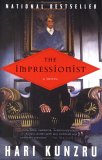Summary | Excerpt | Reading Guide | Reviews | Readalikes | Genres & Themes | Author Bio

Then everything fell ominously silent. He strained his ears into the gathering darkness, hearing the immense noise of insects, the rasp of parrots arguing in the trees. Nothing else. Nothing human. Soon a maid came, carrying an oil lamp, which she set on the table in front of him. At once moths started beating against its glass sides.
"The baby is born," said the maid, with an odd, triumphant expression on her face. "It is a boy. The mother is dead."
He nodded resignedly. Then he looked at his watch, opened his case, took out pen and paper, and set to work.
The chart was strange and frightening. The stars had contorted themselves, wrung themselves into a frightening shape. Their pattern of influences had no equilibrium. It was skewed toward passion and change. To the astrologer this distribution looked impossible. Forces tugged in all directions, the malefic qualities of the moon and Saturn auguring transmutations of every kind. It was a shapeshifting chart. A chart full of lies. He kept going back to the almanac to check his results, covering his brown-flecked paper in calculations.
The boy's future was obscure. The astrologer could predict none of the usual things--length of life, marital prospects, wealth. Patterns emerged, only to fade when another aspect of the conjunction was considered. Planets seemed to flit through houses, hovering between benign and malevolent positions. Clusters of possibilities formed, then fell apart. He had never been so confused by a reading.
Perhaps (though he would not have liked to bet on it) there was a route through the chaos. If so, then it was certainly a bizarre one. How could so many delusions lead to their opposite, to the dissolution of delusion? He glanced up at the square of light in the upstairs window. The child would have to endure suffering and loss. Could he really tell the father this? The man was grieving for his wife. On the table a mandala of crisped moth corpses lay around the lamp. The astrologer thought of the dead woman, and shuddered.
When the maid came back, she found him sitting in front of a fresh, neat chart depicting a bland future of long life, many sons, and business success. The torn-up pieces of the first attempt had been stuffed, out of sight, into his case.
When the astrologer brought the master his new son's chart, Pandit Razdan seemed satisfied, but everyone knows that astrologers say what their clients want to hear. If a man's beard is on fire there is always someone who will warm their hands on it, but then again who gives a tip to the bearer of bad news? As soon as Anjali saw the white-skinned baby, she knew it was ill starred.
The baby cooed and gurgled, and a boy ran down to the cremation ghats for a priest, and the midwives burned bloody sheets in the garden. No one, it seemed, had a thought for the dead mother beyond disposing of her body as quickly as possible. The girl had been an anomaly, an irritant against the skin of a smooth-running household. Now there was a silent agreement to treat her as a vision, a temporary phenomenon that had simply evaporated.
Anjali, too, thought it was for the best that Amrita had died. It was a wonder she had lasted so long. The family seemed overjoyed by their son. So big! So healthy! Yet she could not look at the child without thinking of his true parentage, of a Brahmin woman defiled by the pale man in the photograph. Still, she might have been able to hold her tongue--if the child had not become such a monster.
Reprinted from The Impressionist by Hari Kunzru by permission of Dutton, a member of Penguin Putnam Inc. Copyright © 2002 by Hari Kunzru. All rights reserved. This excerpt, or any parts thereof, may not be reproduced without permission.
Your guide toexceptional books
BookBrowse seeks out and recommends the best in contemporary fiction and nonfiction—books that not only engage and entertain but also deepen our understanding of ourselves and the world around us.